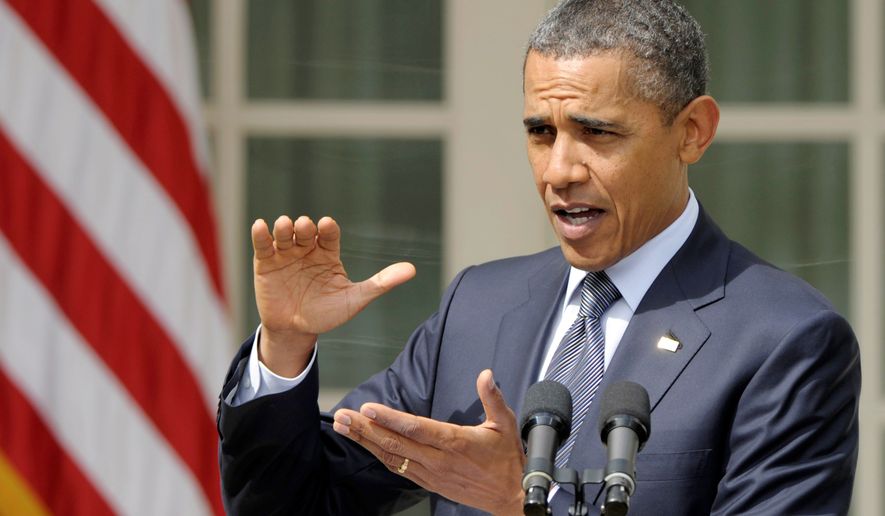Seeking to put his stamp on deficit-reduction talks, President Obama on Monday said he will veto any debt plan that cuts Medicare benefits without also imposing higher taxes on the wealthy, and he embraced a broad call that all millionaires be made to pay an effective higher tax rate on income than middle-class families do.
Though the White House said the goal was to give directions to the 12-member deficit supercommittee now meeting, the plan, which the president laid out in a speech in the Rose Garden, also had the effect of energizing liberal advocates and Democrats in Congress, who said they have been waiting for Mr. Obama to take a strong stand in favor of tax increases.
But tucked inside the documents and the president’s speech Monday is the outline of the same deal he offered House Speaker John A. Boehner in July: Couple changes in Medicare with significant new tax increases.
“I will not support any plan that puts all the burden for closing our deficit on ordinary Americans,” Mr. Obama said. “I will veto any bill that changes benefits for those who rely on Medicare but does not raise serious revenues by asking the wealthiest Americans or biggest corporations to pay their fair share.”
The supercommittee is scheduled to hold its second hearing later this week and will focus on the government’s tax policies.
Even as both sides bitterly fight over spending and tax increases, a rough consensus is developing that the tax code in general needs to be streamlined and special tax breaks need to be eliminated — a call Mr. Obama made Monday, and one Mr. Boehner made in a speech of his own last week.
Still, Mr. Boehner said the president’s ante on Monday had “not made a serious contribution” to the ongoing discussions.
“This administration’s insistence on raising taxes on job creators and its reluctance to take the steps necessary to strengthen our entitlement programs are the reasons the president and I were not able to reach an agreement previously, and it is evident today that these barriers remain,” the Ohio Republican said.
The plan marks the president’s most recent effort to take control of the spending debate. His budget, which he submitted to Congress in February, was a non-starter, garnering no support when it was put to a vote in the Senate. Then in the spring, after he and Congress narrowly averted a government shutdown, Mr. Obama delivered a speech laying out similar targets for deficit reduction, but that plan was widely panned for lacking specificity.
On Monday, Mr. Obama sought to provide specifics, producing an 80-page document laying out where he would find savings or force reductions in overhead spending in the Medicare and Medicaid programs, though those changes wouldn’t take effect until 2017.
Included in the plan are calls to raise security fees on air travel and asking military retirees to pay a fee when they enter Medicare, and Mr. Obama also called for federal employees to pay an additional 1.2 percent of their paychecks in contributions to the federal retirement system.
That proposal drew fire from the American Federation of Government Employees, whose president, John Gage, said it amounted to a $21 billion tax increase aimed directly at federal workers.
Overall, Mr. Obama’s political base gave guarded praise, saying he was right to focus on tax increases, though they were still wary of the components that could be part of an eventual deal.
His embrace of the so-called “Buffett Rule,” which argues that those at the top end should pay an effective tax rate at least as high as middle-income earners, also won praise from Democrats.
“Anybody who says we can’t change the tax code to correct that, anyone who has signed some pledge to protect every single tax loophole so long as they live, they should be called out,” Mr. Obama said.
Republicans said it amounted to class warfare, but Mr. Obama said it was more a matter of necessity than politics.
“This is not class warfare; it’s math,” Mr. Obama said. “The money’s got to come from someplace.”
The White House argues that Mr. Obama’s plan totals $4.4 trillion in deficit reduction over the next 10 years, though $1.1 trillion of that comes from war savings that all sides agree was going to happen anyway. An additional $1.2 trillion already was cut in last month’s debt deal, and a further $430 billion comes from lower interest payments because of the potential lower debt.
The president also repeated his call to raise $467 billion in taxes to pay for his jobs-stimulus plan, released last week, which calls for more infrastructure spending and temporary tax cuts.
That means the president’s plan totals about $1.2 trillion worth of new revenue and cuts, of which the bulk comes from his long-standing vow to raise taxes back to Clinton-era rates on the top income brackets. The rest is $580 billion in reductions to formula-driven entitlement programs, with much of it coming from reducing overpayments and finding waste.
Those $580 billion in newly proposed cuts are dwarfed nearly 3-to-1 by the $1.5 trillion in additional taxes the president wants to see going forward.
Mr. Obama said his plan calls for $2 in cuts for every $1 in tax increases, but he reaches that total by recounting cuts already in law or planned, and by including lower debt service.
The White House said if Mr. Obama’s plans are enacted, debt held by the public would peak above 75 percent of gross domestic product in 2013 — a rise of 15 percentage points in just three years — but would then begin a slow decline to reach 73 percent in 2021.
• Stephen Dinan can be reached at sdinan@washingtontimes.com.




Please read our comment policy before commenting.